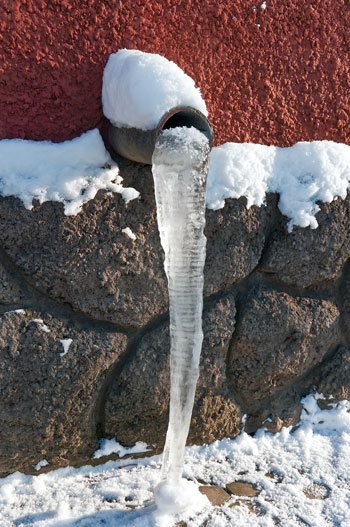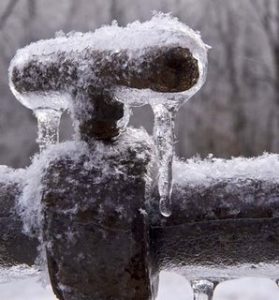Updated March 22, 2023
 There’s nothing like a cozy wrap to keep out winter’s chill. That’s true whether you’re talking about people or pipes. Take steps now to protect your plumbing, ahead of the season’s first hard freeze, and you’ll avoid the damage of frozen pipes.
There’s nothing like a cozy wrap to keep out winter’s chill. That’s true whether you’re talking about people or pipes. Take steps now to protect your plumbing, ahead of the season’s first hard freeze, and you’ll avoid the damage of frozen pipes.
Washington and Oregon generally have mild winters, but there are usually times each year when the mercury drops and pipes can freeze. Here’s what you need to know to keep pipes toasty and water flowing during cold weather, and if you’re seeing this post a little too late, what to do if your pipes burst.
Prevent Frozen Pipes
Now that Winter is here and freezing temps are a possibility, here are a few things you can do to prevent frozen pipes:
- Locate Vulnerable Pipes
- Wrap Exposed Interior Pipes
- Upgrade Exterior Wall Insulation
- Drain Outdoor Spigots
- Find The Water Main
Locate Vulnerable Pipes
The pipes that run through unheated areas of your home are the ones most likely to freeze. This includes pipes in exterior walls and plumbing that’s on the outside of buildings. Think about the attic or basement as these two areas are usually colder than the rest of the house and water supply lines can be found.
Wrap Exposed Interior Pipes
Take a look around the attic, crawl spaces, garage, and other unheated sections of the house. If you see exposed pipes, they’ll need to be protected: Wrap foam pipe insulation on any exposed plumbing. Foam insulation is inexpensive, effective, and easy to install. Heat tape is also available, but requires electricity for operation.
Not only will it help prevent pipes from freezing, but the foam may reduce the cost of heating your water. Just like insulation in your walls, it keeps your hot water pipes and water a few degrees warmer. It could be worth a few extra minutes in the shower every morning and even keep cold water cooler in the summer.
Upgrade Exterior Wall Insulation
Exterior walls need to have enough insulation to protect plumbing. If your walls lack insulation, or if the insulation wasn’t properly installed, your pipes could freeze. Even if the walls aren’t in areas that are considered living spaces, it can help keep the house envelope sealed.
Pipes to the kitchen sink often run through an exterior wall. If you see water damage, mold or mildew in that area, it’s possible the pipes froze and leaked or burst in the past. Adding more insulation to the wall may prevent future problems.
As a stopgap measure, during a freeze you can open kitchen and bathroom cabinets so warm air can reach the wall and section of pipe that is exposed. Also, consider letting the water drip in the sinks, bathtubs, and showers in the house. Running water takes longer to freeze than standing water.
Drain Outdoor Spigots
It’s also important to get your outdoor plumbing ready for winter. A frozen outdoor hose can damage interior pipes. Water expands as it freezes, and when water freezes in a hose, it may put pressure on the closed faucet and pipes. Pipes eventually burst under the stress.
Drain garden hoses, disconnect them and store them for the season. Close the interior shut-off valve to outdoor faucets. Drain water from the spigot and place foam insulators on each outside faucet. You can even wrap your outdoor spigots (also known as hose bibs) with insulation to further protect your pipes.
Find the Water Main
Even if you take preventative measures, one of your pipes could leak or break. Knowing where to find the water main is essential to preventing more damage. If your pipes freeze, you’ll need to quickly shut off your home’s water to prevent flooding.
 What if my Pipes Burst?
What if my Pipes Burst?
Pipes that freeze and then defrost have an increased chance of bursting, causing water leaks that can lead to floods that damage the structure of your home as well as your valuables. One way to avoid this hassle is to educate yourself so you are ready in the event of a plumbing emergency.
In the case of a burst pipe, do the following:
- Turn off the water main shut-off valve, which is usually located at the water meter or where the main line enters your home. Leave the faucets open until your plumber has had a chance to repair the damage. If you have your own private well, be sure to use the shut-off located near or on the well holding tank.
- If you’re unsure where your shut-off valves are and your pipes have not burst, do yourself a huge favor and find them now to save time in an emergency.
- If your home or basement has flooded, consider whether you have any live electrical cords or outlets submerged before stepping into the standing water. If in doubt, wait for your plumber or call your local Public Works Department for assistance.
Why do Frozen Pipes Burst?
While it may seem counterintuitive, it is not usually the ice forming in the pipe that causes it to break. Rather, the expansion inside the pipe caused by the frozen water increases water pressure between the ice blockage and the closed faucet. Due to this pressure buildup, pipes most often burst in areas that have not yet frozen, which results in an immediate leak of icy water.
How to Fix Frozen Pipes
If you suspect you have a frozen pipe (you don’t have full water pressure for example), don’t panic–but do take action. Call a trusted plumber immediately to report the issue. Do not attempt to thaw a frozen pipe with an open flame: This process can be dangerous and inefficient. Instead, find the frozen pipe and you may be able to thaw the pipe with a hand-held hair dryer, heating pad, or space heater.
Simply open the faucet and apply heat to the pipe slowly, beginning close to the faucet end and moving toward the frozen area. While working on your leak or burst pipe, be sure you are not standing in water. Doing so while working with electrical items can cause electrocution.
A Plumber for Every Season
Simpson Plumbing can help you take care of your pipes all year round. Call us today to find out more about winter-ready plumbing and our affordable preventative maintenance plans.

 About Us
About Us  Services
Services  Plans
Plans  Commercial
Commercial